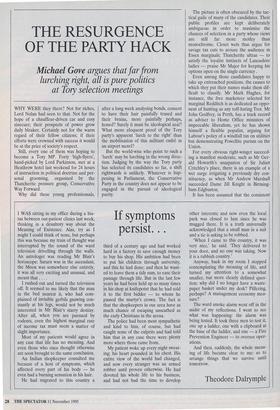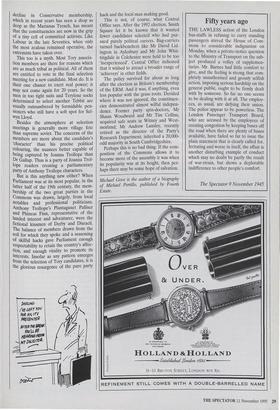THE RESURGENCE OF THE PARTY HACK
Michael Gove argues that far from
lurching right, all is pure politics at Tory selection meetings
WHY WERE they there? Not for riches, Lord Nolan had seen to that. Not for the hope of a chauffeur-driven car and cosy sinecure; their prospects of power grow daily bleaker. Certainly not for the warm regard of their fellow citizens; if their efforts were crowned with success it would be at the price of society's respect.
Still, every one of them was hoping to become a Tory MP. Forty 'high-flyers', hand-picked by Lord Parkinson, met at a Heathrow hotel last weekend for 24 hours of instruction in political doctrine and per- sonal grooming, organised by the Thatcherite pressure group, Conservative Way Forward.
Why did these young professionsals, after a long week analysing bonds, consent to have their hair painfully teased and their brains, more painfully perhaps, honed? Surely it must be ideological zeal? What more eloquent proof of the Tory party's apparent 'lurch to the right' than the mobilisation of this militant cadre in an airport motel?
But the world-wise who point to such a 'lurch' may be lurching in the wrong direc- tion. Judging by the way the Tory party has selected its candidates so far, a shift rightwards is unlikely. Whatever is hap- pening in Parliament, the Conservative Party in the country does not appear to be engaged in the pursuit of ideological purity. The picture is often obscured by the tac- tical guile of many of the candidates. Their public profiles are kept deliberately ambiguous in order to maximise the chances of selection in a party whose views are still far more motley than monochrome. Closet wets thus argue for savage tax cuts to arouse the audience in Essex marginals; Thatcherite ultras — to satisfy the loyalist instincts of Lancashire ladies — praise Mr Major for keeping his options open on the single currency .
Even among those candidates happy to take up entrenched positions, the causes to which they put their names make them dif- ficult to classify. Mr Mark Hughes, for instance, the free marketeer selected for marginal Redditch is as dedicated an oppo- nent of hunting as any toff-hating Trot. Mr John Godfrey, in Perth, has a track record as adviser to Home Office ministers of impeccable liberalism, yet he has shown himself a flexible populist, arguing for Labour's policy of a windfall tax on utilities but demonstrating Powellite purism on the Union.
For every obvious right-winger succeed- ing a manifest moderate, such as Mr Ger- ald Howarth's usurpation of Sir Julian Critchley's place, there is an example of a wet surge irrigating a previously dry con- stituency, as when Mr Andrew Marshall succeeded Dame Jill Knight in Birming- ham Edgbaston.
It has been assumed that the consistent decline in Conservative membership, which in recent years has seen a drop as deep as the Marianas Trench, has meant that the constituencies are now in the grip of a tiny cell of committed activists. Like Labour in the late Seventies, when only the most zealous remained operative, the extremists have taken over.
This too is a myth. Most Tory associa- tion members are there for reasons which are as much tribal as political. All of them are entitled to vote in the final selection meeting for a new candidate. Most do. It is their one chance to exert real power; it may not come again for 20 years. So the men in too tight suits and Terylene socks determined to select another Tebbit are usually outnumbered by formidable pen- sioners who still have a soft spot for Sel- wyn Lloyd.
Besides the atmosphere at selection meetings is generally more village fete than supreme soviet. The concerns of the members are more about the candidate's character' than his precise political colouring, the nuances better capable of being captured by Joanna Trollope than Dr Gallup. Thus is a party of Joanna Trol- lope readers creating a parliamentary party of Anthony Trollope characters.
But is this anything new either? When Parliament was at its most popular, in the latter half of the 19th century, the mem- bership of the two great parties in the Commons was drawn, largely, from local notables and professional politicians. Anthony Trollope's Plantaganet Palliser and Phineas Finn, representative of the landed interest and adventurer, were the fictional kinsmen of Derby and Disraeli. The balance of members drawn from the soil for which they spoke and a seasoning of skilful hacks gave Parliament enough respectability to retain the country's affec- tion, and enough vitality to promote its interests. Insofar as any pattern emerges from the selection of Tory candidates, it is the glorious resurgence of the pure party hack and the local man making good.
This is not, of course, what Central Office says. After the 1992 election, Smith Square let it be known that it wanted fewer candidates selected who had pur- sued purely politcal careers. Bag-carriers turned backbenchers like Mr David Lid- ington in Aylesbury and Mr John Whit- tingdale in Colchester were held to be too `inexperienced'. Central Office indicated that it wished to attract a broader range of `achievers' in other fields.
The policy survived for about as long after the election as Britain's membership of the ERM. And it was, if anything, even less popular with the grass roots. Derided where it was not ignored, the constituen- cies demonstrated almost wilful indepen- dence. Former party spin-doctors, Mr Shaun Woodward and Mr Tim Collins, acquired safe seats in Witney and West- morland; Mr Andrew Lansley, recently retired as the director of the Party's Research Department, inherited a 20,000- odd majority in South Cambridgeshire. Perhaps this is no bad thing. If the com- position of the Commons allows it to become more of the assembly it was when its popularity was at its height, then per- haps there may be some hope of salvation.
Michael Gove is the author of a biography of Michael Portillo, published by Fourth Estate.



















































































 Previous page
Previous page